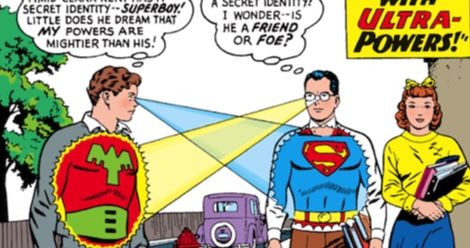
Cold War Paranoia and the Legion of Super-Heroes
One of my favorite things about reading old comics is seeing echoes of past cultural contexts in stories about people in Day-Glo tights punching each other on the chin. I was particularly struck by this recently, when I read The Legion of Super-Heroes: The Silver Age, Volume 1, which collects Legion and Legion-adjacent stories from 1958–1963. I’ve never really followed the Legion, but I have read an awful lot of Silver Age comics, so I sat down expecting the usual secret identity shenanigans, rigid gender roles, and ludicrous pseudo-science.
And yeah, I got that. But I also found myself immersed in a world of extreme paranoia and vicious exclusionism, a world where your neighbor might be out to destroy your way of life and where no one, including you, is what they seem.
In other words, I found myself in the Cold War.
Again and again in this collection of what was originally lighthearted, disposable entertainment for children, I came upon stories where Clark was sent into a panic because a mysterious stranger had come to town to find out his secret identity, or where the Legion suspected a murderous spy in their midst. I found a cast of characters who couldn’t tell the truth to save their lives, and didn’t trust anyone around them as far as they could throw them. In fact, out of the 24 stories in the book, fully 14 of them revolve around secrets, spies, traitors, and enemies in disguise. Y’all, this book stressed me out.
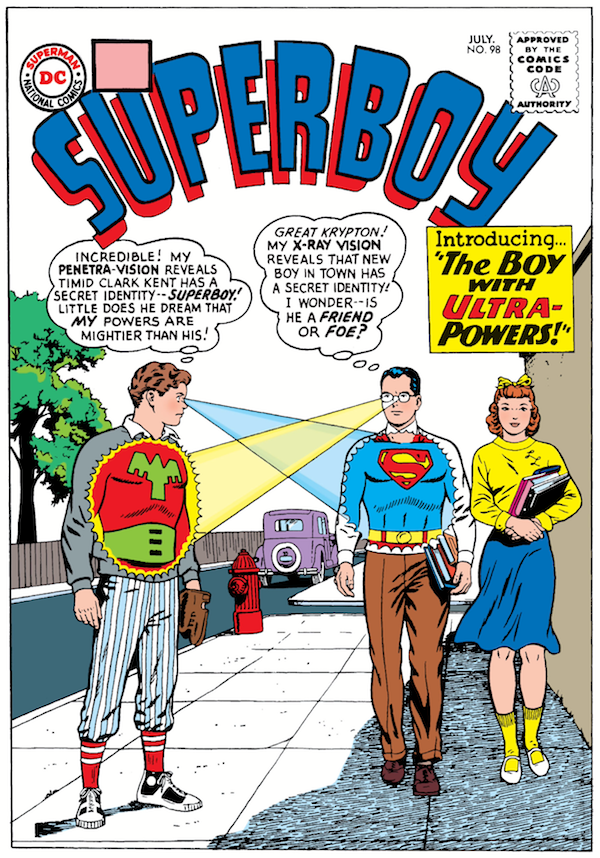
TRUST NO ONE.
In the very first Legion story, for example, the three founders of the Legion (Saturn Girl, Cosmic Boy, and Lightning Lad) arrive in Smallville dressed in 20th century clothes and troll Superboy by addressing him as “Clark Kent” while he’s in costume and “Superboy” when he’s out of it, enjoying his flop sweat as he wonders how these strangers found out his secret and to what sinister ends they intend to put this knowledge. They pull the same stunt on Supergirl a couple years later for her own induction into the Legion. A little bit later Saturn Girl visits Supergirl again, this time with a lead mask riveted over her face so that Supergirl will have to guess her secret identity. Why would anyone do this??? (And how?) What bizarrely unhealthy culture would someone have to live in to think this would be a fun idea that wouldn’t cause neck strain and maybe epilepsy???
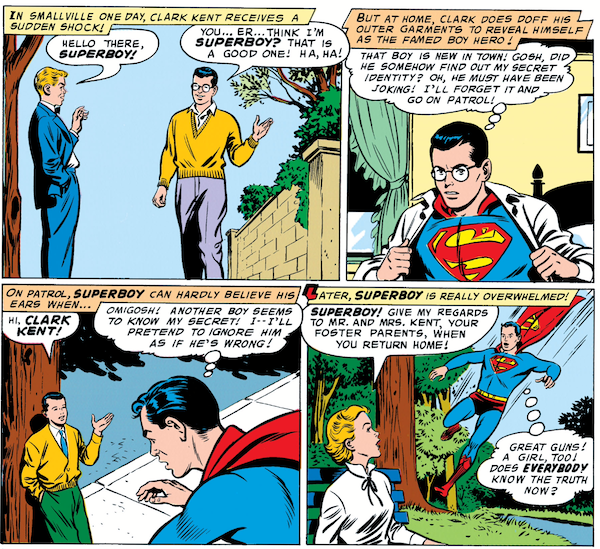
What a fun and normal way to introduce yourself to someone you admire!
And these are the most innocent trips to Smallville! In Mon-El’s first appearance, “Superboy’s Big Brother!” Clark Kent decides that the teenage boy who has crashed to Earth with amnesia must be his brother, even though the boy he dubs “Mon-El” doesn’t seem convinced. When Clark realizes Mon-El’s belt is made of a metal not found on Krypton (sure) he decides that Mon was pretending to be his brother for sinister purposes, even though the whole brother thing was Clark’s idea in the first place. He promptly tests this theory by risking Mon-El’s life by exposing him to kryptonite, which has no effect, and then, semi-accidentally, to lead, which turns out to be fatal to anyone from Daxam, Mon-El’s real home planet. The only way to save Mon is to banish him to the Phantom Zone, for criminals, because Superboy almost killed him for no reason. The American way indeed!

“I don’t trust this guy for believing what I told him!”
Even more rich in paranoia is Ultra Boy’s first appearance, “The Boy with Ultra-Powers!” When a strange boy arrives in Smallville with the secret goal of finding out Superboy’s secret identity, Clark’s best friend Pete is immediately suspicious of his new classmate’s vague backstory—you know, like normal children are. For his part, new boy “Ben Crane” suspects that Pete is Superboy—that is, until some bullies trip Clark and his glasses don’t break, which could only happen if they’re super space glass, I guess. There’s a great moment where Clark and Ben discreetly X-ray vision each other’s clothing to reveal the super-suits they wear underneath which honestly sells the whole “TRUST NO ONE; SPY ON EVERYONE” undercurrent of this book better than anything I could write.
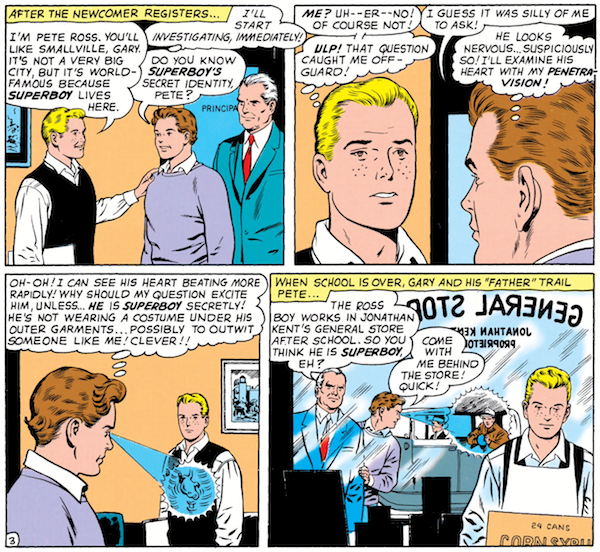
Oh—the Ultra Boy/Pete interaction is also SUPER homoerotic, presumably by accident.
Things come to a head when Pete decides that since he’s written about Clark’s secret in his diary, the safest place for it is a safety deposit box at the bank, because a) who better to protect your secrets than capitalist authority? and b) who wouldn’t want to go to the bank and open up their safety deposit box every time they want to write “Gosh, do you think Lana Lang will invite me to the Sadie Hawkins Dance?” An accident leaves him trapped in the lead vault and Ben steps up to rescue him, then reveals to Clark that he’s Ultra Boy, and this extremely invasive adventure has been his initiation into the Legion.
Perhaps even more dystopian is Sun Boy’s initiation in “The Secret of the Seventh Super-Hero!” which begins with a reform school escapee named Tom Tanner arriving in Smallville. As was not uncommon in the Silver Age, he’s a dead ringer for Clark, and so he naturally decides to take over Clark’s life. When Ma Kent mentions Clark’s other identity to the boy she thinks is her son, Tom reveals the truth, and tells her that unless she lets him continue to play Clark, he’ll expose Clark’s secret.
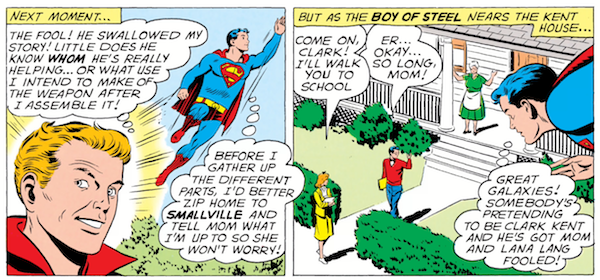
That’s Tom Tanner with Lana, obviously.
Meanwhile, Sun Boy arrives from the future and explains to Superboy that his initiation consists of finding a superweapon that the Legion disassembled and hid in the 20th century. Once Superboy helps him put the weapon back together, it turns out to be a robot with kryptonite-laced eye beams that can change good people to bad and vice versa (sure). Sun Boy sics the robot on Clark Kent…but gets Tom Tanner instead, turning him into a gentle amnesiac who sets off into the world to do some good. The authoritarianism is chilling. (“Sun Boy” turns out to be an imposter, which Clark knew the whole time, because the real Sun Boy knows the secret Legion handshake.)
It’s not just Clark who’s deceived and tormented by new Legionnaires, of course. In “The Secret Power of the Mystery Super-Hero,” a new member joins the team but refuses to share his superpower. After a stint as “Mystery Lad,” he finally reveals that his power is changing substances on the elemental level, and is rechristened Element Lad. No good reason for hiding his power is ever given. Meanwhile, in “The Secret of the Mystery Legionnaire,” aspiring member “Marvel Lad” (I smell a lawsuit!) demonstrates all the powers of Superboy and Mon-El plus invulnerability to both lead and kryptonite. After being inducted, he reveals himself to be Mon-El in disguise. It seems that Brainiac 5 cured him of his vulnerability to lead some time back and they kept this miracle a secret for…reasons? Because why be forthcoming when you could be an absolute tool?
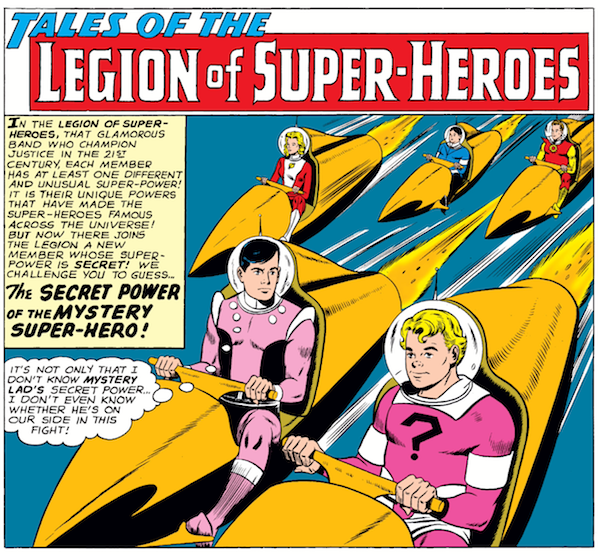
Mystery Lad went ALL IN on his theme.
Then, of course, there’s the familiar Silver Age category of “heroes acting wildly out of character,” such as in “Prisoner of the Super-Heroes!” in which Saturn Girl mentally compels all of Smallville to hate Superboy so much that he’s forced to flee Earth. He ends up on a prison planet, where he’s locked in a kryptonite cage by the Legion founders, who have found archival footage of him destroying a U.S. aircraft carrier and are convinced he’s now a dangerous criminal. After Clark proves that he’s still a hero by saving everyone on the planet from the deadly element sigellian by changing its molecular structure with a super-shout (I! LOVE! COMICS!), he reveals that the U.S. president totally asked him to destroy the aircraft carrier and he just couldn’t explain earlier for reasons of national security, then promptly forgives the Legionnaires for 100% trying to kill him.
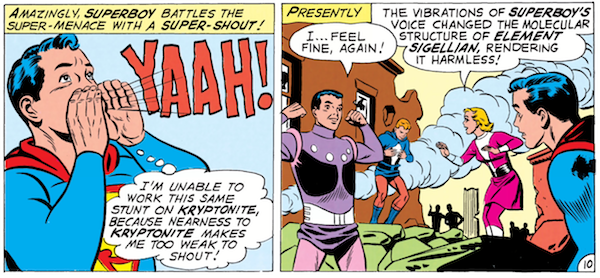
SCIENCE!
Similarly, “The Legion of Super-Traitors” begins with Clark almost destroying a plane filled with passengers, then tormenting poor Krypto for no reason. The founders show up, also acting out of character, as they attempt to free Phantom Zone criminals and then attack Clark with Kryptonite rings. It’s finally revealed that all four heroes are being controlled by giant brains from outer space who want to take over Earth, naturally. (The day is saved by the Legion of Super-Pets, whose animal minds can’t be controlled by the giant brains, leading to the highlight of this story, which is Lightning Lad riding Krypto like a horse.) And in “The Stolen Super-Powers!” after receiving a prophecy from space, Saturn Girl mind controls the other Legionnaires into voting her their leader, then becomes a total tyrant, using strange medallions to steal their powers as punishment for the slightest offenses. (It’s because she wants to keep them out of a fight in which the space prophecy said a Legionnaire was fated to die, but still.)

Comics are our society’s greatest art form.
Finally, there’s the “spy infiltrates the Legion” category of stories. In “Supergirl’s Greatest Challenge!” Supergirl visits the Legion, only to discover that they’ve been replaced by chameleon men (no connection to Chameleon Boy, I don’t think), who temporarily send Supergirl to the Phantom Zone. In “The Doom of the Super-Heroes!” the uncreatively named villain “Mask Man,” who boasts a “super-disguise power,” meaning he could be anyone, kills a bunch of Legionnaires (they get better) before being exposed as a future descendent of Mr. Mxyzptlk. Most hilariously, in “The Fantastic Spy!” the Legion’s secret missions keep leaking to their enemies, even after they take the precautions of turning off the lights to foil hidden cameras and lip-reading, and wearing helmets to prevent telepathic spying. Things go sour when Brainiac 5 accuses their newest member, Matter-Eater Lad, of being the spy because he’s a virtual stranger, while Matter-Eater Lad accuses Brainiac 5 because of his evil ancestor, Regular Brainiac. The real culprit, of course, turns out to be a tiny little man hidden in Sun Boy’s ankle bone by an evil doctor. Obviously.

Matter-Eater Lad, doing what you would expect, hilariously.
Now, the elaborate deceptions and weird excuses for out-of-character behavior in these stories can’t just be chalked up to the time period. Silver Age comics, especially DC comics and especially especially Superman comics, were constrained by both the Comics Code Authority and Superman’s (or Superboy’s) vast powers. The CCA, which took effect in 1954 in response to a public outcry against the violence and gore in comics, forbade sexual content, drugs, gore, extreme violence, vampires and werewolves (!), evil triumphing over good, or anything that would inspire “disrespect of established authority” including portraying a cop or politician as a bad guy. (Yiiikes.) At the same time, Superman was so powerful at this point that he could essentially juggle planets. (See above, where he changes the molecular structure of a poison by yelling real loud.)
It’s very hard to tell stories about an all-powerful hero in a world where nothing bad is allowed, and so the creators often fell back on stories about secrets and lies, which physical strength can’t do anything about, or drew the reader in with covers showing familiar characters acting against type and then had to use the comic inside to explain why that happened. And to be fair, this was a huge part of why Silver Age DC is so wildly, thrillingly creative, because all the restrictions placed on the creators made them go super duper weird in response.
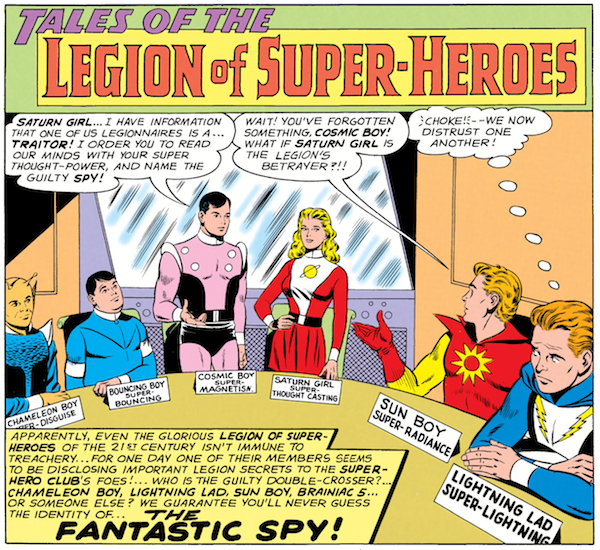
A typical Legion splash page.
But it also meant that the characters come across as total sociopaths more often than not, as they scheme and trick and mislead to stay one step ahead of their friends and teammates, who are also scheming and tricking and misleading. And again, I was used to this, because I’ve read a lot of Silver Age DC. But the sheer volume and intensity of the paranoia and discomfort I encountered in these early Legion stories took me by surprise.
I don’t know why the Legion in particular is so laden with toxicity and suspicion. The stories in the volume come from a number of series written by a number of writers, so it’s not one specific voice crafting this narrative, although it’s interesting to note that the lion’s share (15 out of 24) were written by Superman co-creator Jerry Siegel. By the time these stories were written, Siegel had already left DC once, when he was drafted in World War II, and sued them during the war for publishing Superboy stories based on an unpublished story he’d written, despite DC having never purchased the rights to the younger version of Clark Kent. He’d returned to DC in the late ’50s, but as a work-for-hire writer with no creative control and no bylines in the stories he wrote, and DC fired him in 1966 when they learned that he and Superman co-creator Joe Shuster were planning to sue them again. It’s certainly possible that Siegel’s feelings of being betrayed by DC seeped into his work for them.
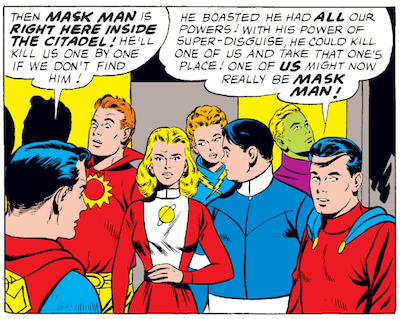
Yeah, that’s…sort of what a mask is.
But Siegel didn’t write all of the stories referenced above. And just as atomic fears infuse the comics of the ’50s and ’60s and post-Vietnam moral disillusionment fuels so much of the comics of the ’80s, these late ’50s and early ’60s stories seem to be steeped in their own particular historicultural broth. They’re the kind of stories I would expect from a society technically at peace, but constantly tensed for apocalyptic war—one where rigid conformity is enforced as an extension of national security, and policing your neighbors’ strange behavior is the name of the game. And maybe it’s the Legion in particular because thinking about the future made the writers more sensitive, even if subconsciously so, of their present.
Or maybe I’m way off base. But I’m interested in reading more Legion comics and seeing if these themes continue. And I’m looking forward to someday looking back at contemporary comics, and seeing what hindsight can tell us about today.













